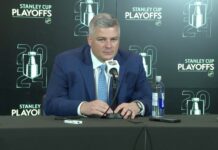November is almost over and here’s where the Toronto Maple Leafs stand:
- 9-10-4 record
- Zero impressive regulation wins
- Third last in the Eastern Conference in points percentage
- On a 78-point pace
- Currently riding an 0-5-1 losing streak
Thus, the organization pulled the trigger and fired head coach Mike Babcock to try to save their season.
When the Leafs signed Mike Babcock, it was supposed to be the start of turning the franchise around. He signed a record eight-year contract worth $50 million (an average of $6.25 million per season), making him the highest-paid coach in NHL history. In his four full seasons, the team went finished with the following point totals: 69, 95, 105 and 100. The 105-point season is a franchise record.
But with it came three first-round playoff exits. The team often struggled as the season went on and hockey tightened up – something their run-and-gun game is not made for. This season, they tried to tighten their game from the start, getting away from off the glass and long bomb breakouts, and it did not go well. They are a bottom-10 team in expected goals and heat maps show a team that is often shooting from the points and perimeter instead of prime scoring areas in the house. This passes the eye test as well.
There have been and probably will continue to be stories that come out about damaged relationships between Babcock and the players. It should be noted that this is nothing new or surprising – these stories came up when he was in Detroit as well, and that team was very successful. I’m not comparing the two by any means, but players also rather famously hated Scotty Bowman, and he’s arguably the best coach in the league’s history. It will be used as an indictment on Babcock and perhaps there’s some merit, but really this came down to the process of the team play, the results, and the organization’s belief that things were not going to improve.
That last part can probably be debated – Babcock has made the playoffs in 14 of his 16 full seasons in the league. The two misses were the year after he went to the Cup with Anaheim (they lost players like Paul Kariya and Adam Oates) and his first season with the Leafs when they purposely bottomed out. He’s also lost out in the first round of the playoffs five straight times. Since going to the Cup finals in back-to-back years a decade ago, his teams have never advanced past the second round (they made it to the second round three of the four years after those back-to-back Cup appearances).
The team also introduced two new assistant coaches – both seemingly struggling to operate their respective special team units – and has had a number of notable injuries, not once having a fully healthy roster this season. At some point, would that have naturally normalized?
But the decision was made and now there is a collection of things to untangle and sort through.
How did we get here?
It is noteworthy that it was, in fact, Brendan Shanahan that conducted the press conference, not General Manager Kyle Dubas. That is the most important press conference and news that will come out of the organization this season, and the General Manager was not immediately present or accountable to any of it.
In Mike Babcock’s statement, he did not name Kyle Dubas or even reference him. It is, at minimum, fair to suggest that they did not get along on a number of things. Regardless of who was right or wrong, a General Manager and Head Coach can’t be at odds. There were a number of times that Dubas did not publicly endorse Babcock when asked, including in the summer when he noted Babcock’s job will be reviewed like everyone does (which has been noted, while technically true, he could have publicly supported him and elected not to).
The two most obvious benefits to Babcock’s replacement, Sheldon Keefe, is that he is on the same page with Dubas (an obvious pro) and he also has a good understanding of the Toronto Marlies – this could lead to better use of the organization’s depth to help fill holes at the bottom of the Leafs roster.
The betting money is on at least some form of boost in play. Last year, an article ran that found in the last 10 seasons, interim head coaches have stepped into teams with a .481 points percentage before their hiring, and combined to finish the season with a .551 points percentage since that point. And that doesn’t include what Craig Berube did with St. Louis later that season. He became the fourth Head Coach over the last 11 seasons to take over their team midseason and win a Stanley Cup. If anything, those are pretty good odds.
With this Leafs roster and sitting under .500, it is a near certainty that they will see some sort of uptick.
But how did we even get here?
A few seasons ago, this organization was chugging along smoothly. They had a front office of Lou Lamoriello, Kyle Dubas and Mark Hunter with Mike Babcock coaching the Leafs and Keefe the Marlies. That’s a lot of pedigree and accomplishment, and there was not so much as a peep of bad news in the media about the team (which was strange) other than people randomly arguing on Twitter whether a move was a Lou or Dubas move. While some will argue the pedigree and impact of certain individuals in that ring, what was clear is the Leafs employed a diverse and accomplished group of thinkers to make decisions, collecting input from various levels of experience and background.
Now just Dubas and Keefe are left.
There have been cracks in the armour and a number of strange moments. The Leafs signed all three of their star RFAs to big deals. Every single one was a story and headache to some degree – the Leafs didn’t win any of the negotiations. All three players have had bewildering moments since, as well. William Nylander returned and struggled for the rest of the season, although he is rebounding so far this season. Auston Matthews was charged over the summer and didn’t even tell the organization. Mitch Marner signed a massive deal for a winger and didn’t have an even-strength goal through 18 games (although he did have 18 points, in fairness).
The thought at the time of Lou’s departure is the organization couldn’t risk losing Dubas – which seemed like a likely possibility at the time – and while we aren’t going to go back and wonder what if or if it was the right call, the organization was, generally speaking, ascending steadily. Now, they had to fire their once prized Head Coach midseason and the GM didn’t even announce it.
This circles back to an interesting point by Elliotte Friedman over the weekend when he discussed the possibility of Babcock being fired:
Babcock takes a lot of the heat right now — rightly or wrongly. If he does get let go, the heat is going to come in a lot of other directions, and I think there are people there who recognize that.
Now the pressure falls squarely on the shoulders of Kyle Dubas. Over the weekend, I had tweeted that I didn’t understand how a share of blame for the Leafs struggles wasn’t being proportioned among the players and the GM. Most of the replies I received defended Dubas and placed the blame squarely on the shoulders of Babcock. Fans are completely convinced this is pretty well on Babcock.
Now we will see what happens moving forward with this unequivocally being Dubas’ concoction now. This was always going to be his bullet in the chamber — to fire the Head Coach because he didn’t hire him — and we all pretty well knew if he was going to bring in a new coach, it would be Keefe. Now, this is his team, his coach, and his management/analytics group.
Notes
- I have seen a lot of comments saying the Leafs should explode offensively now, and I’m wondering what that will look like relative to now? Auston Matthews is on pace for 50 goals, William Nylander is on pace for 29, and John Tavares has 14 points in 16 games. Mitch Marner was at a point per game when he got injured and Morgan Rielly was on pace for over 60 points (which looked like a fair regression based on a career-high season across the board last year). Tyson Barrie is the obvious candidate for a notable jump in production, but generally speaking, it wasn’t as if anyone was grossly underperforming otherwise.
- The most obvious room for improvement is special teams – the power play is at 18th and the penalty kill is at 27th, both much lower than they should be. That said, the Leafs are retaining the coaches that are currently overseeing them. Not sure how that dynamic will work behind closed doors and how much change will happen there. Both those units needs serious re-thinks.
- Interestingly, in one of Babcock’s last press conference, he noted that they didn’t practice the penalty kill enough and referenced the sports science department and resting players as a reason why. Wonder if that was a shot at management potentially handcuffing how he’d like to run his team.
- Kind of lost in everything is that Sheldon Keefe is a rookie NHL Head Coach. I know some people will say that it doesn’t matter at all and others will say the Toronto Maple Leafs is not an entry-level position. Naturally, the answer falls somewhere in the middle (as it almost always does in these ‘Twitter’ debates!), but coaching the NHL is hard no matter the team and this might be the most difficult job in hockey. The constant scrutiny, the way quotes are often misconstrued, the fan criticism — it is a lot.
- Before the Leafs hired Mike Babcock I wrote that “Most coaches who start a rebuild do not see it through.” Babcock is officially part of that list now. It is a little sad to see the way that this all ended – the team was, truly, a dumpster fire when he got here. He was a big part of turning things around in Toronto. Babcock brought a swagger and confidence to this organization that wasn’t seen in a decade. When he said he was going to extend with the team because they were going to be so good, it had meaning and value to the fanbase. Good things repeatedly happened to the organization while he was here – winning the lottery, Mitch Marner falling in the draft to them, signing John Tavares – and while he isn’t really the reason that any of those things happened, it felt like he was driving the organization forward, especially early on. His quotes were often mocked about — gud pro and a gud man — but I thought he was a genuine, honest person that cared about doing the right thing. There is no doubt he can be difficult, combative and stubborn, but I also don’t think he suddenly forgot how to coach (or that he was never a good coach). I won’t be surprised if he lands on feet, similar to Lou Lamoriello, and finds success elsewhere.


![Jim Montgomery Post Game, Bruins 4 vs. Leafs 2: “[Marchand] still manages to get under people’s skin, yet he doesn’t cross the line” Jim Montgomery, Boston Bruins post game](https://mapleleafshotstove.com/wp-content/uploads/2024/04/jim-monty-pg-to-218x150.jpg)























![Jim Montgomery Post Game, Bruins 4 vs. Leafs 2: “[Marchand] still manages to get under people’s skin, yet he doesn’t cross the line” Jim Montgomery, Boston Bruins post game](https://mapleleafshotstove.com/wp-content/uploads/2024/04/jim-monty-pg-to-100x70.jpg)







